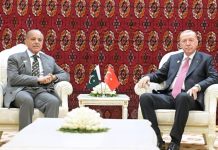From Abid Usman
KARACHI: Dr Amjad Saqib, a Pakistani philanthropist and founder of the country’s largest interest-free microfinance programme Akhuwat, has been nominated for the Nobel Peace Prize for his humanitarian work in poverty alleviation.
As many as 343 candidates from around the world have been nominated for the Nobel Peace Prize for 2022 – 251 individuals and 92 organisations.
“My services are beyond such awards and they are purely for the sake of Allah,” Akhuwat Foundation Chairman Dr Amjad told The Express Tribune.
Dr Amjad said no person can nominate himself for the Nobel Prize and there is no lobbying involved in the entire process.
“An official of a foreign country might have recommended my name for the award as people across the world are familiar with my services for humanity… but I am not aware of any such development,” he said while responding to a question that a minister of Malta recommended his name for the prestigious award.
Dr Amjad, was one of five recipients of the Ramon Magsaysay Award — named after a Filipino president killed in a plane crash — for his “first-of-its-kind” interest- and collateral-free microfinance programme that has helped millions of poor families.
Nearly two decades after its launch, Akhuwat has grown into the nation’s largest microfinance institution, distributing the equivalent of $900 million and boasting an almost 100 per cent loan repayment rate.
Dr Amjad, who uses places of worship to hand out money, was cited for “his inspiring belief that human goodness and solidarity will find ways to eradicate poverty.”
Having graduated from King Edward Medical University, Dr Amjad started his career by joining the esteemed civil service of Pakistan in 1985.
He served at various high-level government positions including Punjab Rural Support Programme (PRSP), a rural development and microfinance initiative by government of Punjab for seven years. The programme aimed at social mobilisation, community organisation and provision of financial access to the poor.
Concluding that an alternative method is needed to cater to the needs of the poor, he decided to resign from the civil service and dedicate his life to the mission of creating a poverty-free society by founding Akhuwat.
Dr Amjad resigned from Civil Service in 2003 and founded Akhuwat the same year. He has been its CEO and main driving force since beginning. With seventeen years of successful operations, Akhuwat now presents a viable model of Shariah-compliant microfinance, which is both sustainable and replicable. Besides Akhuwat, the philanthropist is voluntarily serving many civil society organisations in the realm of education, health, disability, banking and finance.
The Nobel Peace Prize is awarded on the day of Alfred Nobel’s death, the 10th of December, a time-honoured tradition since 1901.
Dr Amjad Saqib became third Pakistani after Dr. Abdul Salam and Pakistani youth activist Malala Yousafzai, she was awarded the 2014 Nobel Peace Prize on Friday, an honor she shares with Kailash Satyarthi, who has long been campaigning against child exploitation in neighboring India.
But until about two years ago, Malala was just a 15-year old blogger on a school bus with her friends. It was Oct. 9, 2012, when armed Taliban men boarded Malala’s bus and shot her in the head, transforming her from a minor Internet celebrity into an international symbol.
It’s hard to believe that she’s accomplished so much — including recovery from her injuries — in only two years, but Malala’s story actually started long before the assassination attempt that launched her to worldwide fame. She was born in the Swat valley in Pakistan, in 1997, to parents who encouraged her love for education from a young age. Her father, Ziauddin, opened a private school for boys and girls, partly to fight against gender discrimination in Pakistan.
“My father educated my brother and me, but he didn’t send my sisters to school,” he told The Guardian. “I thought it was an injustice.” When Malala was born, he named her after a Pashtun heroine and never curbed her ambition.”Don’t ask me what I did, ask me what I did not do,” Ziauddin said in a TEDtalk about his daughter that quickly went viral, “I did not clip her wings.”
As a toddler, Malala would sit in classrooms in her father’s school and follow lessons for 10-year olds. Aryn Baker wrote in her 2012 profile of Malala for



